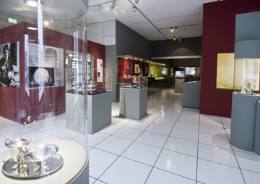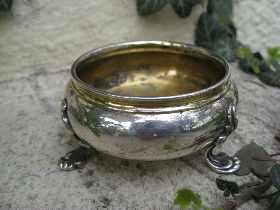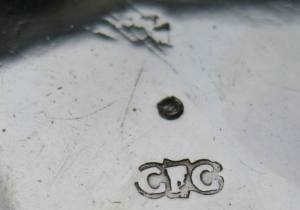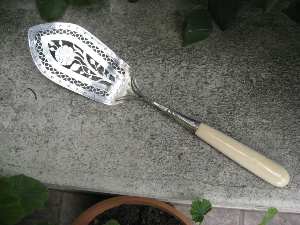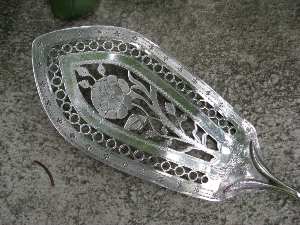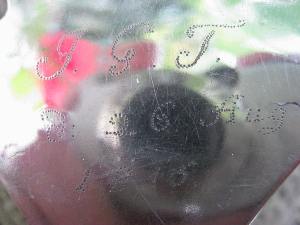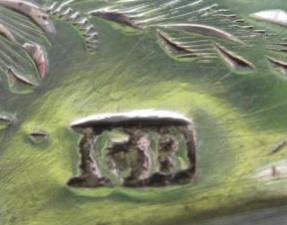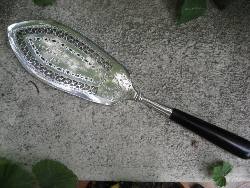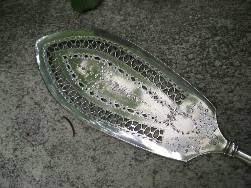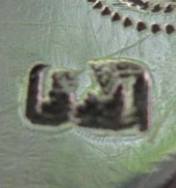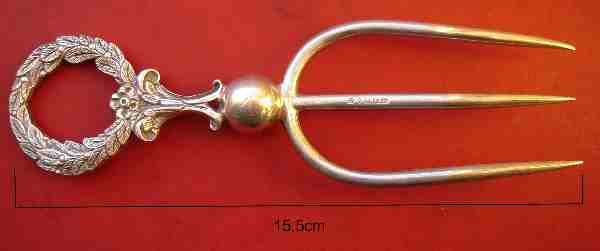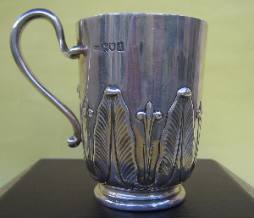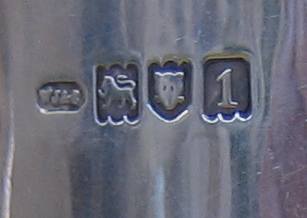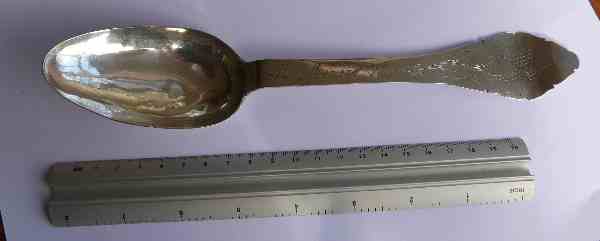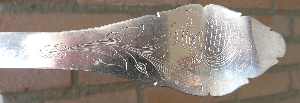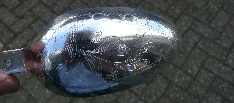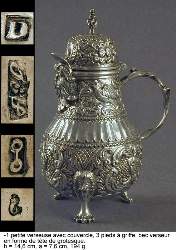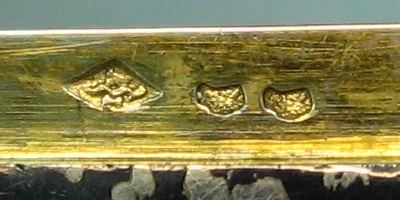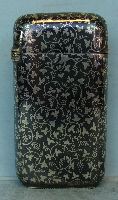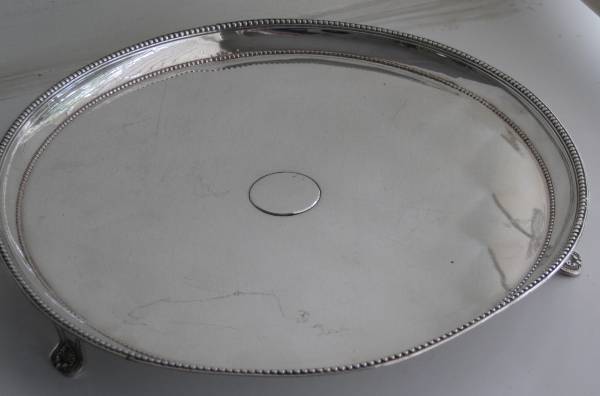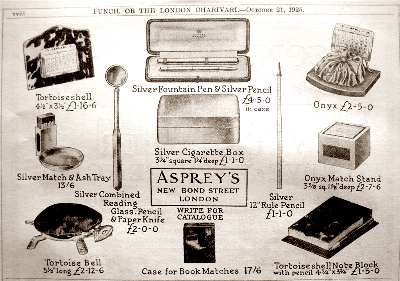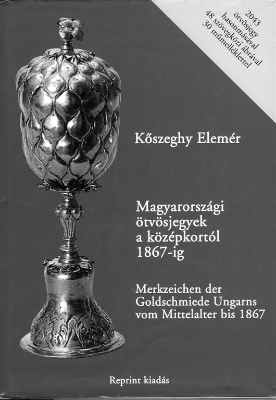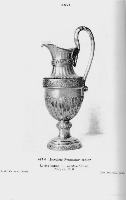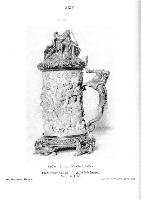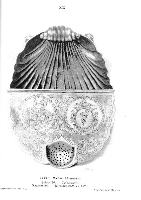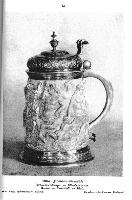 newsletter
# 86 July 2011 newsletter
# 86 July 2011www.ASCASonline.org SITE MAP email: silverassociation@yahoo.it |
||||||||||||
New membersWelcome to new ASCAS members:
Adrian Stuart Grond - Switzerland
|
|
top page -
page map |
Members' Window # 86
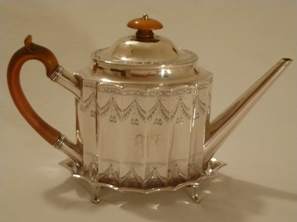
Joanne and Emmett Eldred
present the second of their series of articles:
|
Mail to ASCAS: e-mail silverassociation@yahoo.it
Alan Yates writes:
...I wondered if members could assist with the identification of
the mark on the underside of a salt that I bought in South
Africa about 20 years ago. The size of the salt is 7.5 cm across
x 115 gms, a good weight. The interior is gilded. Based on the
style, my guess is that it is Georgian.
I naturally suspected that it could be a Cape silversmith but
nothing in Stephan Welz' book entitled Cape Silver and
Silversmiths. Also nothing in any of Wynyard Wilkinson's books
on Indian and Indian colonial silver.
I should be most grateful for any assistance
Alan
Alan Yates writes:
...Another contribution to a future ASCAS magazine:
Images attached of two very good silver fish slices I bought in
South Africa on an S Welz/Sothebys sale about 15 years ago. They
were one lot, and although accurately described, when it came to
the makers (for they are by two different makers) and country of
origin, in the catalogue it was simply stated that they were
‘Continental’. Probably correct because the workmanship is of an
extremely high standard. I would date both as ca 1815.
The first one (first four images) has an ivory handle, and the
maker's mark seems to be 'CB' or 'CH'? Dot-engraved inscription
on underside 'J.G.T. 26 Aug 1815' Total length 37 cms.
The second (last three images) has an ebony handle, and the
maker's mark seems to be 'IM' ? No other marks or inscription.
Total length 34 cms.
Could anyone shed further light on, in particular, the makers
and country of origin?
Best wishes
Alan
Charles Deheselle writes:
...I'd wish to have information about the origin of this fork.
Thanks in advance for your help
Best regards
Charles Deheselle
Your item is silver plate (not sterling or solid silver)
made by WW Harrison. Information about this maker in my web site
at
http://www.silvercollection.it/electroplatesilverH.html
Giorgio Busetto
Joseph Scerri writes:
...Please can you tell me who the maker of this cup is?
Best regards,
Joseph Scerri
The maker of the cup (hallmarked London 1906) is W. H.
Jackson & Son. This mark was entered on 2nd September 1905.
The firm was created in c.1877 as a partnership of William Henry
Jackson and Walter Chase and was active as W.H. Jackson & Son c.
1905 until c. 1910
Giorgio Busetto
Huub van der Sanden writes:
...I recently bought this 18th century spoon with for me unknown
hallmarks.
Is there anyone who can help me?
Thank you
Huub van der Sanden
Christiane Soubeyrand writes:
...I am a new member. I need you help to identify the origin of
this little pot.
Despite my research I can not find any info.
What do you think about? Can you help me with this
identification?
Thanks in advance
Christiane Soubeyrand
Replies to questions
Bruno Bruni
receives this answer about the mark of his vesta case
(see June 2011 Newsletter)
Robert Massart writes:
The maker’s mark on Bruno Bruni's vesta case belongs to
Alfred Inderbitzen, who was a Parisian contract manufacturer,
operating at 153 rue Lamarck.
N° de garantie: 2406
N° de préfecture: 14853
Symbol: a horseshoe nail
Registration date of the maker: 20 March 1916
Robert Massart
Oskar M. Zurell writes:
French vesta case - Question of Bruno Bruni:
The vesta case is made by the Paris contractor silversmith
Alfred Inderbitzen (by name it seems to be an Alsace?).
Details: Orfèvre Alfred Inderbitzen; Contract manufacturer;
symbol: 'un clou de fer à cheval' = a nail of a horseshoe;
number of warranty: 2406; number of préfecture: 14853; date of
maker's mark registration: 20 March 1916; workshop address: 153
rue Lamarck, Paris 75.
This vesta case seems to be made, maybe in a little serie, to
fulfil a contract order, in the workshop of Alfred Inderbitzen
Oskar M. Zurell
Simon Buxton receives
this answer about the mark of his old Sheffield plate salver
(see June 2011 Newsletter)
Oskar M. Zurell writes:
The centred piece prevents the hot tea-kettle to slide too
much around.
We must imagine a servant who has to rush up just in time to
serve the beloved "5 o'clock tea time"; but he has got also the
order for some other activities.
My assumption of purpose of this salver's centred piece is, to
prevent the hot tea-kettle to slide too much around when used in
rush-up circumstances.
If now this centred piece becomes a nuisance? That seems to me,
is not the problem of the piece itself, but that of the user;
because it's used for the wrong purposes, for which it wasn't
determined.
Collecting Silver could be done on several levels - and well in
between these levels too.
The advanced collector, like as you imagine more then only the
object itself - he is 'seeing' the objects appearance,
determined from design, to production methods, to its
circumstances of use, e.g. in this case as a servant's server.
Oskar M. Zurell
"A PAGE per MONTH"
In this column we present a page obtained from makers'
brochures, books, auction catalogs, advertising or whatever
other printed paper, related to silver, that may be of interest
for ASCAS members.
The images will be published at a "low resolution" level and for
private and personal use only
"A WORD per MONTH"
In this column we
present an abstract from a page of the "What is? Silver
Dictionary"
courtesy of


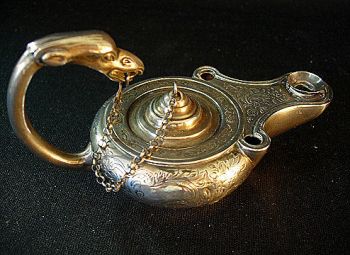
|
CIGAR LIGHTER
|
"A SILVERSMITH per MONTH"
In this column
we present marks, information and history of silversmiths and
silver manufacturers.
This column is published under the kind permission of Giorgio
Busetto's website


KIRK STIEFF CORPORATION
|
"A BOOK ON MY SHELF"
In this column we present books, new
or ancient, dealing with silver in all its aspects (history,
marks, oddities...). This isn't a "book review" but only a fair
presentation of some useful "tools" that anyone may have in the
shelf of his bookcase.
ASCAS members are invited to contribute to this column
(click to enlarge images)
In the "book on my shelf" of this month Karin Sixl-Daniell presents:

Custom Search
Closing our July 2011 edition of ASCAS Newsletter I hope you have appreciated its content.
Your comments, suggestions and advice will be of great help.
My thanks to Dorothea Burstyn, Charles Deheselle, Jayne Dye, Joanne and Emmett Eldred, Robert Massart, Joseph Scerri, Karin Sixl-Daniell, Christiane Soubeyrand, Huub van der Sanden, Alan Yates and Oskar M. Zurell for their invaluable contributions.
Giorgio Busetto
Secretary
ASCAS is a community of people having a common
interest in antique silver.
|
